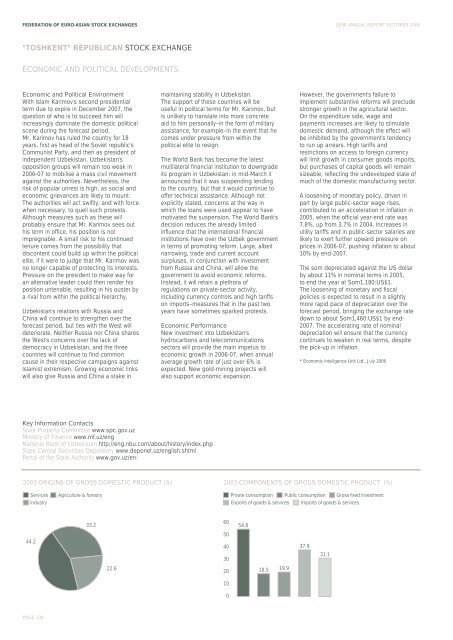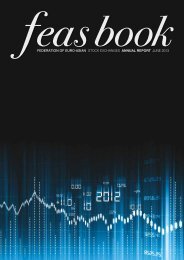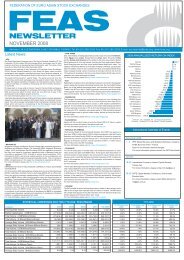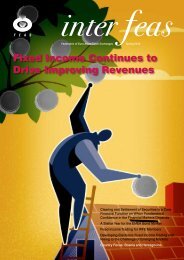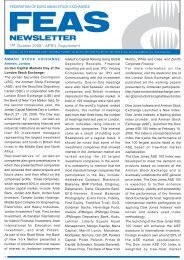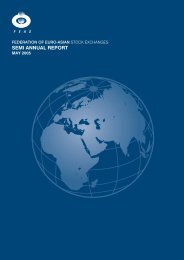Download - FEAS
Download - FEAS
Download - FEAS
Create successful ePaper yourself
Turn your PDF publications into a flip-book with our unique Google optimized e-Paper software.
FEDERATION OF EURO-ASIAN STOCK EXCHANGES SEMI ANNUAL REPORT OCTOBER 2006<br />
“TOSHKENT” REPUBLICAN STOCK EXCHANGE<br />
ECONOMIC AND POLITICAL DEVELOPMENTS<br />
Economic and Political Environment<br />
With Islam Karimov's second presidential<br />
term due to expire in December 2007, the<br />
question of who is to succeed him will<br />
increasingly dominate the domestic political<br />
scene during the forecast period.<br />
Mr. Karimov has ruled the country for 18<br />
years, first as head of the Soviet republic's<br />
Communist Party, and then as president of<br />
independent Uzbekistan. Uzbekistan's<br />
opposition groups will remain too weak in<br />
2006-07 to mobilise a mass civil movement<br />
against the authorities. Nevertheless, the<br />
risk of popular unrest is high, as social and<br />
economic grievances are likely to mount.<br />
The authorities will act swiftly, and with force<br />
when necessary, to quell such protests.<br />
Although measures such as these will<br />
probably ensure that Mr. Karimov sees out<br />
his term in office, his position is not<br />
impregnable. A small risk to his continued<br />
tenure comes from the possibility that<br />
discontent could build up within the political<br />
elite, if it were to judge that Mr. Karimov was<br />
no longer capable of protecting its interests.<br />
Pressure on the president to make way for<br />
an alternative leader could then render his<br />
position untenable, resulting in his ouster by<br />
a rival from within the political hierarchy.<br />
Uzbekistan's relations with Russia and<br />
China will continue to strengthen over the<br />
forecast period, but ties with the West will<br />
deteriorate. Neither Russia nor China shares<br />
the West's concerns over the lack of<br />
democracy in Uzbekistan, and the three<br />
countries will continue to find common<br />
cause in their respective campaigns against<br />
Islamist extremism. Growing economic links<br />
will also give Russia and China a stake in<br />
maintaining stability in Uzbekistan.<br />
The support of these countries will be<br />
useful in political terms for Mr. Karimov, but<br />
is unlikely to translate into more concrete<br />
aid to him personally–in the form of military<br />
assistance, for example–in the event that he<br />
comes under pressure from within the<br />
political elite to resign.<br />
The World Bank has become the latest<br />
multilateral financial institution to downgrade<br />
its program in Uzbekistan: in mid-March it<br />
announced that it was suspending lending<br />
to the country, but that it would continue to<br />
offer technical assistance. Although not<br />
explicitly stated, concerns at the way in<br />
which the loans were used appear to have<br />
motivated the suspension. The World Bank's<br />
decision reduces the already limited<br />
influence that the international financial<br />
institutions have over the Uzbek government<br />
in terms of promoting reform. Large, albeit<br />
narrowing, trade and current account<br />
surpluses, in conjunction with investment<br />
from Russia and China, will allow the<br />
government to avoid economic reforms.<br />
Instead, it will retain a plethora of<br />
regulations on private-sector activity,<br />
including currency controls and high tariffs<br />
on imports–measures that in the past two<br />
years have sometimes sparked protests.<br />
Economic Performance<br />
New investment into Uzbekistan's<br />
hydrocarbons and telecommunications<br />
sectors will provide the main impetus to<br />
economic growth in 2006-07, when annual<br />
average growth rate of just over 6% is<br />
expected. New gold-mining projects will<br />
also support economic expansion.<br />
However, the government's failure to<br />
implement substantive reforms will preclude<br />
stronger growth in the agricultural sector.<br />
On the expenditure side, wage and<br />
payments increases are likely to stimulate<br />
domestic demand, although the effect will<br />
be inhibited by the government's tendency<br />
to run up arrears. High tariffs and<br />
restrictions on access to foreign currency<br />
will limit growth in consumer goods imports,<br />
but purchases of capital goods will remain<br />
sizeable, reflecting the undeveloped state of<br />
much of the domestic manufacturing sector.<br />
A loosening of monetary policy, driven in<br />
part by large public-sector wage rises,<br />
contributed to an acceleration in inflation in<br />
2005, when the official year-end rate was<br />
7.8%, up from 3.7% in 2004. Increases in<br />
utility tariffs and in public-sector salaries are<br />
likely to exert further upward pressure on<br />
prices in 2006-07, pushing inflation to about<br />
10% by end-2007.<br />
The som depreciated against the US dollar<br />
by about 11% in nominal terms in 2005,<br />
to end the year at Som1,180:US$1.<br />
The loosening of monetary and fiscal<br />
policies is expected to result in a slightly<br />
more rapid pace of depreciation over the<br />
forecast period, bringing the exchange rate<br />
down to about Som1,460:US$1 by end-<br />
2007. The accelerating rate of nominal<br />
depreciation will ensure that the currency<br />
continues to weaken in real terms, despite<br />
the pick-up in inflation.<br />
* Economic Intelligence Unit Ltd., July 2006<br />
Key Information Contacts<br />
State Property Committee www.spc.gov.uz<br />
Ministry of Finance www.mf.uz/eng<br />
National Bank of Uzbekistan http://eng.nbu.com/about/history/index.php<br />
State Central Securities Depository www.deponet.uz/english.shtml<br />
Portal of the State Authority www.gov.uz/en/<br />
2003-ORIGINS OF GROSS DOMESTIC PRODUCT (%)<br />
2003-COMPONENTS OF GROSS DOMESTIC PRODUCT (%)<br />
Services<br />
Industry<br />
Agriculture & forestry<br />
Private consumption Public consumption Gross fixed investment<br />
Exports of goods & services<br />
Imports of goods & services<br />
33.2<br />
60<br />
54.8<br />
50<br />
44.2<br />
40<br />
30<br />
37.9<br />
31.1<br />
22.6<br />
20<br />
18.5 19.9<br />
10<br />
0<br />
PAGE 138


